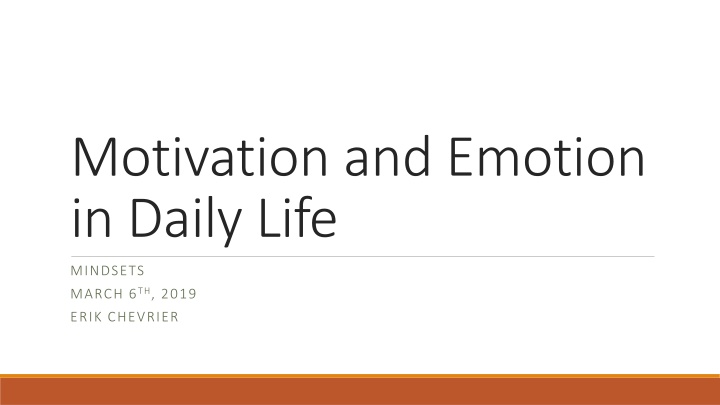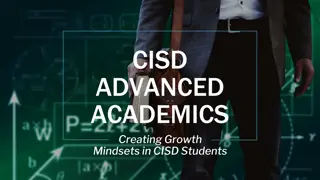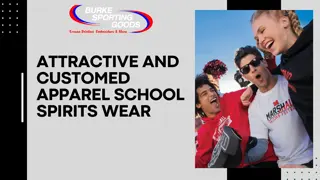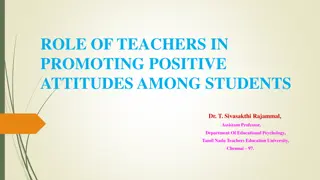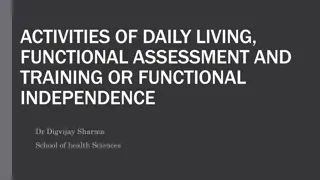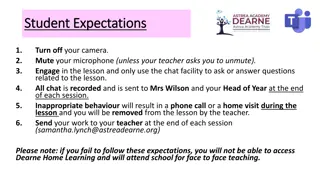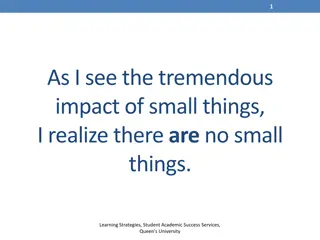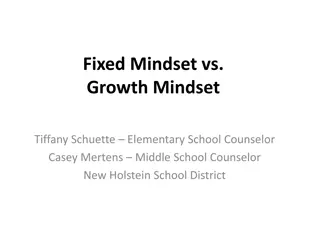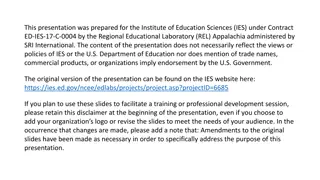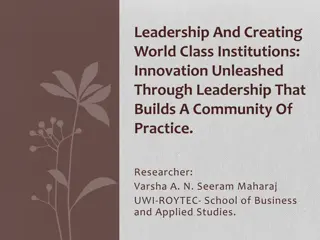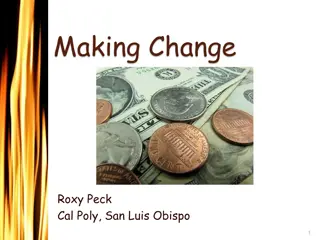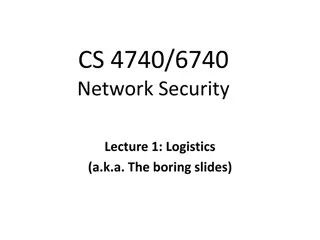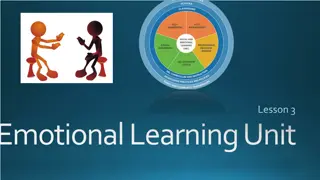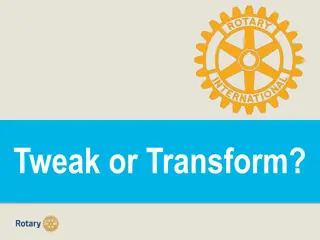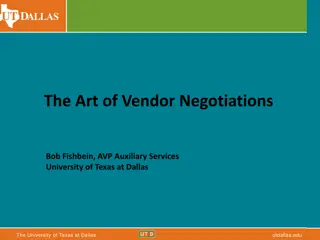Mindsets in Daily Life
The power of mindsets in shaping our thoughts, feelings, and actions. Discover the impact of different mindsets on motivation, intelligence, learning, and goal-setting. Learn how to cultivate a growth mindset for personal growth and success.
Uploaded on Feb 25, 2025 | 0 Views
Download Presentation

Please find below an Image/Link to download the presentation.
The content on the website is provided AS IS for your information and personal use only. It may not be sold, licensed, or shared on other websites without obtaining consent from the author.If you encounter any issues during the download, it is possible that the publisher has removed the file from their server.
You are allowed to download the files provided on this website for personal or commercial use, subject to the condition that they are used lawfully. All files are the property of their respective owners.
The content on the website is provided AS IS for your information and personal use only. It may not be sold, licensed, or shared on other websites without obtaining consent from the author.
E N D
Presentation Transcript
Motivation and Emotion in Daily Life MINDSETS MARCH 6TH, 2019 ERIK CHEVRIER
Question Do you agree or disagree with the following statements/qeustions? Your intelligence is something about you that cannot change very much. You can always greatly change how intelligent you are.
Question Are you someone who continuously strives to be your ideal self? Are you someone who is content with who you are and strive to fulfil your duties and responsibilities as they are now?
Question You see a puzzle in a science magazine and it s labeled Test Your IQ! You work on it for a very long time, get confused, start over and over, and finally make progress, but very slowly, until you solve it. How do you feel? Do you feel sort of stupid because it required so much effort? Or do you feel smart because you worked hard and mastered it?
Question Would you rather look smart and competent but at the sacrifice of learning something new? Would you rather learn something new, useful or important, but at the sacrifice of looking smart or competent?
Question What mindset do you employ when you are setting a goal? What mindset do you employ when you have decided on a goal and need to realize it?
Mindsets A mindset is a cognitive framework to guide one s attention, information processing, decision making, and thinking about the meaning of effort, success, failure, and one s own personal qualities. Once adopted, a mindset functions as a cognitive motivational system that produces many important downstream consequences in one s thinking, feeling and acting. Each mindset provides a pair of contrasting motivational systems that exist simultaneously within each individual. The motivational systems coexist, but people tend toward one motivational system rather then the other. This tendency toward one motivational system or the other occurs sometimes as the result of: Chronic personality differences Situation-specific circumstances
Three Mindsets and Their Associated Motivational Systems
Deliberative Implemental Deliberative Mindset: people think about what they would like to do which desire to be acted upon, which goal to be chosen, which need is to be prioritized, which preference is to be pursued, and which environmental incentive is to be acquired. Attention is cast wide highly open-minded where many options are considered and each option is assessed. Information about the desirability and feasibility of a possible goal is welcomed. Implemental Mindset: Once a goal has been set and committed to, the person generally benefits from making mindset transitions from goal setting to goal striving from focus on motivation to volition. The person no longer thinks about the desirability and feasibility of rival goals but, instead, concentrates on getting started and persisting until goal attainment. The person is close-minded and attention is focused narrowly to concentrate only on information that is related to goal attainment. Shields against non-goal-related information and considerations.
Discussion Last class you set goals What was your deliberative process (i.e. what led you to decide on that particular goal)? What did you do after you set your goal (i.e. what was the implemental process you engaged in)? If you haven t employed your implemental strategy yet, how would you?
Promotion Prevention Promotion Mindset: Improvement-based regulatory style Involves sensitivity to positive outcomes Striving to attain what one does not have already approach ideal end states Concern is with growth and advancement Chronic promotion mindset is fostered by parents who encourage making good things happen, self- improvement and accomplishing ideals Prevention Mindset: Security-based regulatory style Involves sensitivity to negative outcomes Striving to maintain and not lose what one already has maintain a sense of duty, obligation, responsibility Chronic prevention mindset is developed when parents are critical, punishing and restrictive Both can be the result of chronic personality dispositions or induced situationally
Promotion vs Prevention
Different Definitions of Success and Failure Success is Promotion Mindset: Presence of a gain Positive outcome means that someone has advanced or improved a state of affairs One has been able to advance a present state towards an ideal state Failure is a non-gain it represents the inability to improve upon the current state Prevention Mindset: Absence of a loss Strives to maintain the satisfactory state Success means that no change has occurred Duty, responsibility and obligation are acted upon to prevent loss Success does not have a special meaning Failure means loss and that a painful change has occurred
Discussion How would a person with a promotion and prevention mindset seek to do well at school?
Different Goal-Striving Strategies When one wants to get a high GPA Promotion focused people will employ the following strategies: Complete schoolwork promptly Attend all classes Spend more time in the library Be prepared for tests Increase motivation to earn a high GPA The strategy is characterized as open-mindedness, exploration, locomotion (getting from present to ideal state), acting fast, and eagerness. Prevention focused people will employ the following strategies: Stop procrastinating Avoid missing any class Spend less time at social gatherings Avoid being unprepared for tests Do not lose motivation to earn a high GPA The strategy is characterized as a safety-based, cautious, staying committed, staying the course, protecting one s commitments, playing it safe, being vigilant and assessing where one stands.
Ideal Self-Guides and Ought Self-Guides Ideal self-guide goal (standard or aspiration) of what one would like to become. Ought self-guides goal (standard or aspiration) specifying what one of others believe you should or must have to do or be. 1 - Please think about something you ideally would like to do. Please think about a hope or aspiration you currently have. 2 - Please list five eagerness-related action plans (i.e. strategies that will make sure everything goes right and helps you realize your hopes and aspirations) 3 - Please think about something you ought to do. Please think about a duty or responsibility you currently have. 4 - Please list five vigilance related plans (i.e. strategies that will help you avoid things that could go wrong and stop you from realizing your duty and obligation) How enjoyable was each task?
Promotion vs Prevention Focus
Regulatory Fit Predicts Strength of Motivation and Well-Being Regulatory fit Decisions and behaviours feel right when people rely on goal strivings means that fit their mindsets People feel that something feels right when one s goal and strategies are matched. Promotion with eager locomotion Prevention with cautious vigilance Regulatory fit also increases motivational strength Promotion focused people exert more effort, feel more alert, value the experience more, cope and perform better when they strive with eagerness rather than vigilance. Prevention focused people exert more effort, feel more alert, value the experience more, cope and perform better then they strive with vigilance rather than eagerness. Regulatory fit contributes to psychological well-being because it leads people to feelings of interest, enjoyment, and satisfaction Regulatory misfit blocks feelings of joy and satisfaction from what they are doing. BOTH ARE NECESSASRY FOR OPTIMAL GOAL STRIVING THE SAME GOAL CAN BE ACHIEVED IN DIFFERENT WAYS
Discussion Two people are going shopping for food to prepare for a group of friends. One person is more oriented towards a prevention focused mindset, the other is more oriented towards a promotion focused mindset. What food purchase strategies do you expect them to employ?
Growth Fixed Mindset Fixed mindset: A belief that personal qualities are fixed attributes. Entity theorists there is a physical entity that dwells inside a person that determines how much of the personality quality a person has. Growth mindset: A belief that personal qualities are changeable attributes. People can change, grow, increase, strengthen, and develop malleable qualities. Incremental theorists personal qualities can develop incrementally over time
Meaning of Effort Growth-Fixed Fixed Mindset: High effort means low ability Effort is useless because ability is fixed Negative feedback causes a withdrawal of effort Employs defeatist strategies protects image and self-esteem On difficult endeavors, maladaptive motivational patterns ensue: Withholding effort Engaging in self-handicapping Never understanding/appreciating what effort expenditures can do for them in life Growth Mindset: Effort is a tool to turn on a vitalize the development of skills and abilities Understands utility of effort Negative feedback causes an increase in effort Reevaluates feedback and adapts better strategies when necessary Shows improved performance over time
Origins of Fixed-Growth Mindsets Fixed Mindset: Ability praise parental and teacher feedback Ability criticism parental and teacher feedback Growth Mindset: Effort praise parental and teacher feedback Effort criticism parental and teacher feedback Can be learned through reinforcement and education
Fixed-Growth Mindsets and Achievement Goals Fixed Mindset: Performance goals they have to perform well, especially when others are watching. Growth Mindset: Mastery goals concerned with mastering something new, and learning something thoroughly. People who adopt mastery goals: Prefer challenging tasks that they can learn from rather than easy tasks on which they demonstrate high ability Use conceptually based learning strategies such as relating information to existing knowledge rather than superficial learning strategies, like memorizing Are more likely to be intrinsically motivated then extrinsically motivated Are more likely to ask for help and information from others that will allow them to continue working on their own
Manifestation of Mastery and Performance Goals in the Classroom
Positive and Productive Ways of Thinking
Discussion Think of a time that your behaviour was incongruent with the way you view yourself. How did you feel about the incongruence? What did you do about it?
Thank you! Questions? Concerns?
Bibliography The information obtained to create this PowerPoint slide was obtained from: Reeve, J. (2018) Understanding Motivation and Emotion, 7thed. John Wiley and Sons
Learning Check What is a mindset? What is a deliberative mindset? What is an implemental mindset? What are consequences of the deliberative and implemental mindsets? What is a promotion mindset? What is a prevention mindset? What are antecedents and consequences of the promotion and prevention mindsets? What are different definitions of success and failure according to the prevention and promotion mindsets? What are different goal-striving strategies for prevention and promotion mindsets? What are ideal self-guides and ought self-guides and how do they relate to eagerness and vigilance action plans? What is regulatory fit and how does it predict the strength of motivation and well-being? What is a fixed mindset? What is a growth mindset? What is the meaning of effort in relation to fixed and growth mindsets? Where do fixed and growth mindsets originate from? What kind of achievement goals are adopted by people with growth and fixed mindsets? What is a mastery and performance goal? What is the benefit of adopting a mastery goal instead of a performance goal? What are the antecedents and consequences of the three achievement goals? What are manifestations of mastery and performance goals in the classroom? How does fear of failure performance avoidance maladjusted coping style in achievement settings relate to motivation, ill-being and mindsets?
